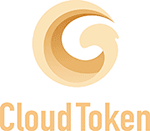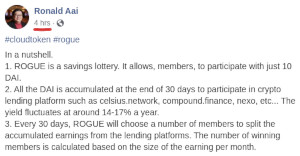Cloud Token launches Rogue unlicensed lottery
 Cloud Token has started branding itself as “Cloud 2.0”. As part of that branding effort, the company has recently launched “Rogue”.
Cloud Token has started branding itself as “Cloud 2.0”. As part of that branding effort, the company has recently launched “Rogue”.
Attempting to clear up confusion among affiliates as to what Rogue is, Cloud Token admin (and suspected co-owner), Ronald Aai, took to Facebook earlier today to explain.
 As per Aai’s explanation,
As per Aai’s explanation,
Rogue is a savings lottery. It allows members to participate with just 10 DAI.
DAI is a cryptocurrency stablecoin, pegged at $1 USD. There does not appear to be any direct links between DAI and Cloud Token.
All the DAI is accumulated at the end of 30 days to participate in crypto lending platform such as celsius network, compound finance, nexo, etc…
The yield fluctuates around 14-17% a year.
Every 30 days Rogue will choose a number of members to split the accumulated earnings from the lending platforms.
The number of winning members is calculated based on the size of the earning per month.
Every 30 days, when a prize is awarded all the interest that has been earned since the last prize is given to the winners divided equally.
To summarize, Cloud Token sells lottery tickets to affiliates starting at 10 DAI.
Each month Cloud Token selects a number of Cloud Token affiliates to award Rogue lottery winnings to.
As the pool expands, more winners will be added in each draw helping more members.
The catch is that Rogue lottery winnings are paid in CTO, which Cloud Token generates at little to no cost on demand.
On the regulatory front, lotteries are illegal in Malaysia unless a permit is sought from the Minister of Finance.
Section three of Malaysia’s Lotteries Act states
Any lottery promoted or conducted without a permit granted by the Minister of Finance under this At or otherwise than in accordance with this Act shall be unlawful.
To date neither Cloud Token or Ronald Aai have provided any indication their Rogue lottery has a permit from the Minister.
Not withstanding international lottery laws and regulation, at a minimum Cloud Token’s Rogue appears to be illegal in Malaysia.
Perhaps of lesser significance given Cloud Token’s core Ponzi business model, but worth pointing out nonetheless.


Is that a setup to shutdown and escape the ponzi?
I don’t think the lottery is an exit-strategy. Just something to distract people as withdrawals exceed new investment.
Bases on video uploads by a few CT affiliates, it appears as if they’re able to withdraw boatloads of cash with no restrictions.
Haven’t seen anyone physically withdraw a large amount of cash from any bank or ATM
from Cloud Token earnings.
The skeptic in me says if they’re not around within a year or two then you can be pretty sure the scheme was bound to collapse by design.
Well of course the video marketing is going to show otherwise. It’s marketing.
Social media has unfiltered (for now) reports of Cloud Token withdrawal problems:
As I understand it this has been happening for some time. But uh yeah, sim cards.
Ah, yes. The good ol’ “withdrawal symptoms”.
Pretty soon the CT corp excuses will start with… “We’re having some minor technical issues, but no worries. Things will be back to normal in a couple of hours. In the meanwhiles, keep pumping cash into the system until we get things up and running again. And don’t give up. It’s only a minor glitch. We’ll explain it all at our next webinar.”
And the hits will keep coming.
I got 3000$ there omg… Better to escape.
How long it will last now?
Same as any other Ponzi scheme, until withdrawals exceed new investment and the admins pull the plug.
As it stands all the usual suspects in CT are moving to EXAA The likes of Ankur Agrawal, Simon Stepsys, Vitality Dublin. They know the CT days are numbered…